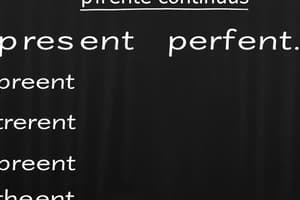Podcast
Questions and Answers
Which of the following structures correctly forms an affirmative present perfect tense sentence?
Which of the following structures correctly forms an affirmative present perfect tense sentence?
- Subject + has/have + past participle (correct)
- Subject + did + past participle
- Subject + was + past participle
- Subject + will + past participle
The sentence 'He has went to the store' is correct.
The sentence 'He has went to the store' is correct.
False (B)
What auxiliary verb is used with third-person singular subjects in the present perfect tense?
What auxiliary verb is used with third-person singular subjects in the present perfect tense?
has
I ______ (not/see) that documentary yet.
I ______ (not/see) that documentary yet.
Match each action with its present perfect tense example.
Match each action with its present perfect tense example.
Flashcards are hidden until you start studying
Study Notes
Present Perfect Tense
Form and Structure
-
Structure:
- Affirmative: Subject + has/have + past participle (e.g., She has eaten.)
- Negative: Subject + has/have + not + past participle (e.g., He has not finished.)
- Questions: Has/Have + subject + past participle? (e.g., Have you seen it?)
-
Auxiliary Verbs:
- 'Has' for third-person singular (he, she, it).
- 'Have' for all other subjects (I, you, we, they).
Common Mistakes
-
Using the wrong auxiliary verb:
- Confusing 'has' and 'have' depending on the subject.
-
Incorrect past participles:
- Using the base form or the wrong form (e.g., "He has went" instead of "He has gone").
-
Overusing with specific time expressions:
- Avoid using with definite past time markers (e.g., yesterday, last week—use simple past instead).
Usage and Function
- Indicates completed actions that have relevance to the present (e.g., I have lost my keys).
- Used to express experiences without specifying a time (e.g., She has traveled to France).
- Describes actions that started in the past and are still ongoing (e.g., They have lived here for five years).
- Used for recent actions that have an effect on the present (e.g., He has just arrived).
Affirmative and Negative Sentences
-
Affirmative Examples:
- I have read the book.
- They have completed the project.
-
Negative Examples:
- I have not seen that movie.
- She has not visited the museum.
Questions and Responses
-
Forming Questions:
- Inversion of the subject and auxiliary verb: Have you finished your homework?
-
Responses:
- Positive response: Yes, I have.
- Negative response: No, I have not.
-
Follow-up questions can be used to probe for more information (e.g., "What else have you done?").
Present Perfect Tense
-
Structure:
- Affirmative: Subject + has/have + past participle (e.g., She has eaten.)
- Negative: Subject + has/have + not + past participle (e.g., He has not finished.)
- Questions: Has/Have + subject + past participle? (e.g., Have you seen it?)
-
Auxiliary Verbs:
- Use 'has' for third-person singular subjects (he, she, it)
- Use 'have' for all other subjects (I, you, we, they)
Common Mistakes
- Using the wrong auxiliary verb:
- Confusing 'has' and 'have' depending on the subject.
- Incorrect past participles:
- Using the base form or the wrong form (e.g., "He has went" instead of "He has gone").
- Overusing with specific time expressions:
- Avoid using with definite past time markers (e.g., yesterday, last week—use simple past instead).
Usage and Function
- Indicates completed actions that have relevance to the present: (e.g., I have lost my keys).
- Used to express experiences without specifying a time (e.g., She has traveled to France).
- Describes actions that started in the past and are still ongoing (e.g., They have lived here for five years).
- Used for recent actions that have an effect on the present (e.g., He has just arrived).
Affirmative and Negative Sentences
- Affirmative Examples:
- I have read the book.
- They have completed the project.
- Negative Examples:
- I have not seen that movie.
- She has not visited the museum.
Questions and Responses
- Forming Questions:
- Invert the subject and auxiliary verb: Have you finished your homework?
- Responses:
- Positive response: Yes, I have.
- Negative response: No, I have not.
- Follow-up questions can be used to probe for additional information (e.g., "What else have you done?").
Studying That Suits You
Use AI to generate personalized quizzes and flashcards to suit your learning preferences.




